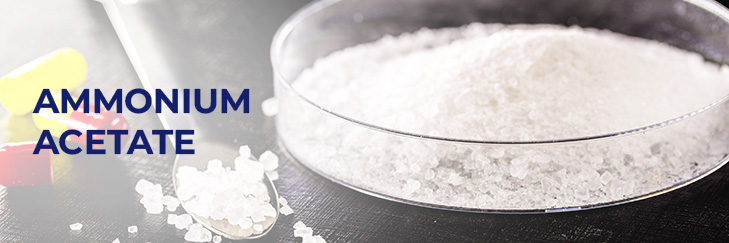INTRODUCTION
Ammonium acetate is a crystalline white solid with a somewhat acetous odour. It is also called the spirit of Mindererus in its aqueous form or Azanium acetate. It is widely used in chemical analysis, in preserving foods, and in pharmaceuticals. It is often used to prepare buffer solutions as it is made up of a weak base and a weak acid combined together.
Manufacture
Ammonium acetate is produced by the neutralization of acetic acid with ammonium carbonate or by saturating glacial acetic acid with ammonia.
| Synonyms | Acetic acid amine Ammonium ethanoate |
| CAS no. | 631-61-8 |
| EINECS no. | 211-162-9 |
| Molecular formula | C2H7NO2 |
| Molecular weight | 77.08 |
| Structure |  |
Applications
| Ammonium acetate is commonly used as a controlling agent for food acidity. It alters or regulates the alkalinity or acidity of foods. |
| It is also commonly employed in the Knoevenagel condensation technique as a catalyst. The Borch reaction during organic synthesis uses the molecule as one of the greatest sources of ammonia. |
| A protein precipitating reagent is made by combining ammonium acetate with completely distilled water. |
| The substance may also be used as a buffer in ESI (electrospray ionization) mass spectrometry of molecules and proteins, as well as a mobile phase in HPLC (high-performance liquid chromatography). |
| It is used in the production of explosives. |
| It is used for making Foam rubber & Vinyl plastics. |
| In analytical chemistry, the compound is used in the form of a reagent. It is used as a reagent in different dialysis procedures for the elimination of contaminants through diffusion. |
| In agricultural chemistry, ammonium acetate, when used as a reagent, helps in determining soil CEC or cation exchange capacity along with the availability of potassium in the soil. |
SPECIFICATIONS
| Test | Unit | Specification |
|---|---|---|
| Description | – | Colorless hygroscopic crystals |
| Assay | % | Min. 96.0 |
| pH (5% solution) | – | 6.5 – 7.5 |
| Chloride (Cl) | % | Max. 0.005 |
| Sulphate (SO4) | % | Max. 0.01 |
| Iron (Fe) | % | Max. 0.001 |
| Heavy Metals (as Pb) | % | Max. 0.001 |
STORAGE
Store in cool dry place.
PACKING
25 kg bags.
REACH status
Ammonium acetate offered by ExSyn is EU REACH registered.
No matter the quantity you need, our exceptional quality and service will make ExSyn your supplier of choice! If you need any additional information or SDS, please contact us.
Iodine is anon-metallic, dark-grey/purple-black, lustrous, solid element. It is the heaviest and the rarest of stable halogens that can be found on the crust of earth.About fifty percent of all iodine produced and manufactured worldwide is used to form Organoiodine compounds. Iodine is an important element for many health-sustaining processes and essential for human thyroid health.
The product, acronymed Oct-NBE, is an organic compound with a cyclic ring system and a 8-membered hydrophobic chain. The structure renders the chemical special properties leading to its applications in diverse fields.
Nicotine is a hygroscopic, colorless to slight yellow, oily liquid, that is readily soluble in alcohol, ether or light petroleum. It is widely used recreationally as a stimulant and anxiolytic.
The product, acronymed ETD, is an organic compound with a fused bicyclic ring system and an ethylidene group. The structure renders the chemical special properties leading to its applications in diverse fields.
Sodium perchlorate monohydrate is the inorganic compound with the chemical formula NaClO4•H2O. It is the common existence form of sodium perchlorate, which can gradually absorb water in the air to form the monohydrate. Sodium perchlorate monohydrate is white rhombic crystal which is highly soluble in water and in alcohol. Its capacity to undergo redox reactions, liberating oxygen atoms, has been harnessed in the preparation of specialty chemicals, including pharmaceutical intermediates and fine chemicals.
Triphenylphosphine is a common organophosphorus compound that is frequently abbreviated as PPh3 or Ph3P. It is widely used in organic and organometallic compound synthesis because it is an effective reducing agent as well as a neutral ligand. At room temperature, PPh3 crystals are relatively air-stable and colourless.
Potassium chlorate holds significant importance across various industries due to its diverse applications. This white crystalline compound has been utilized for centuries as an essential ingredient in the production of matches, fireworks, and explosives, owing to its ability to release oxygen upon decomposition.
Podophyllotoxin is a non-alkaloid toxin lignan extracted from the roots and rhizomes of Podophyllum species. It is an organic heterotetracyclic compound that has a Furonaphthodioxole skeleton bearing a 3,4,5-trimethoxyphenyl substituent.
Octadecylphosphonic acid (ODPA), a versatile chemical compound, serves as a surfactant and dispersant in applications spanning coatings, lubricants, and corrosion inhibition. With its hydrophobic octadecyl chain linked to a phosphonic acid group, it excels in surface modification, boosting adhesion in metal surfaces.
